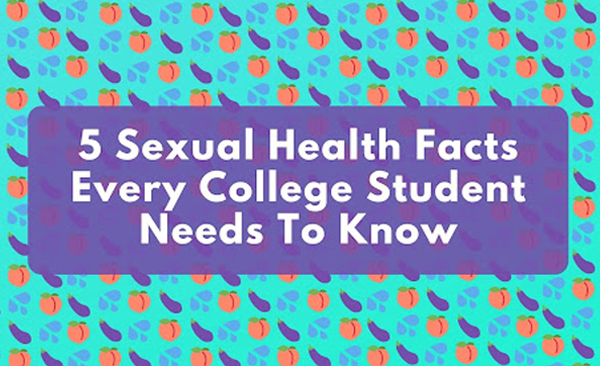5 Sexual Health Facts Every College Student Needs to Know

1. Not all college students are sexually active.
According to the National College Health Assessment, 35% of undergraduate students reported having no sexual partners within the past year, and 49% of undergraduate students reported having 1 – 2 sexual partners within the past year.
Sexual expression is grounded in one’s personal values, beliefs, and experiences. Some students may choose not to be sexually active to focus on their academic and career goals or to avoid the risk of pregnancy or sexually transmitted infections. Others may choose to wait until they find the right partner. Some students may also identify as asexual and not feel sexual attraction to others.
On the flip side, some students may choose to be sexually active because it feels good, to feel connected with their partner, or to boost their self-confidence. Regardless of their reasons, all students should engage in a positive, respectful, and consensual manner.
(American College Health Association – NCHA Spring 2019 Undergraduate Executive Summary)
2. It’s unnecessary to use feminine hygiene products and male enhancement products.
The vagina is self-cleansing, so there’s no need to use scented soaps, feminine washes, and sprays to keep the vagina clean and healthy. These products can actually irritate the skin and disrupt the vagina’s natural pH, which can lead to infection. Vaginal discharge is common and indicates the vagina is self-cleansing and moist.
Male enhancement products and dietary supplements are not regulated by the Food Drug Administration (FDA) so manufacturers don’t have to prove their safety or effectiveness. There’s no evidence that medications, supplements, or exercises will make the penis larger or smaller.
Remember, the function of advertising these products is to convince people that something is wrong with their bodies so they can sell a product to fix it. Everyone’s body is different and that’s okay! Make sure you have all the facts and information if you choose to use these products. If you’re struggling with your body image, talk to a professional therapist or dietician.
The best way for everyone to practice good hygiene is to…
- Drink plenty of water
- Don’t hold your bladder
- Use condoms
- Wear dry, cotton underwear or no underwear
- Wash the genitals with warm water
3. Penetrative sex shouldn’t hurt.
The most common reason vaginal or anal sex may be painful is due to friction from lack of lubrication. Using a small amount of water-based or silicone-based lubricant from Condom Express or your local drug store can help with this.
Remember, the anus and rectum generally do not produce any lubrication, so using lubricant for anal sex is a must. The vagina will naturally lubricate when aroused, but using extra lubricant can be helpful. Going slow and making sure all partners are relaxed is also important.
Sometimes, students may experience difficulty getting aroused or relaxing if they feel nervous or stressed. Talk to your partner about how you feel and your relationship – research shows that couples that talk about sex have more satisfying sexual experiences.
If vaginal sex is still uncomfortable, talk to your healthcare provider about other possible causes such as prescribed medications, infections, vulvodynia, or vaginismus. Pelvic floor therapy may be a possible solution.
4. Erectile difficulties are common and treatable – even for college students.
Occasional difficulty achieving and maintaining an erection has probably affected every person with a penis at some point in their life. For college students, the most common causes are stress, anxiety, cardiovascular risks, or substance use. Stress and anxiety can interrupt the brain’s ability to focus. Substance use can impair blood circulation and numb sensitivity. Managing stress and anxiety, limiting alcohol and substance use, and exercising regularly are practical strategies for caring for your physical and mental health.
If you experience difficulty achieving or maintaining an erection on a more consistent basis, talk to your doctor about possible causes and solutions.
5. Sexually transmitted infections (STIs) can be treated and managed.
Bacterial STIs such as chlamydia, gonorrhea, and syphilis can be easily treated with antibiotics. Viral STIs such as herpes, hepatitis, HPV, and HIV cannot be cured, but there are medications available to alleviate symptoms and reduce the likelihood of spreading to sexual partners (along with consistent and correct condom use). HPV and hepatitis also have preventative vaccines available.
The best way to manage your sexual health is to get tested and talk to your sexual partner(s) about sexually transmitted infections. All sexually active students should get tested for chlamydia and gonorrhea at least once a year, and tested for HIV at least once in their lifetime. Your doctor may recommend additional testing if you have certain risk factors or symptoms, so it’s important to find a doctor you’re comfortable talking to. Log on to your Patient Portal to schedule an appointment. If costs, insurance, or privacy are a concern, talk to your doctor about your options!
Remember, sexually transmitted infections are common, and an inevitable health risk of people simply being in close contact with other people. There’s no need to shame, embarrass, or reject people for having an STI. Many people contract an STI and still have healthy sexual relationships. If you need support navigating your sexual health or relationship, the UHC sexual health coordinator is available to talk confidentially with students.

Written by: Camilla Herndon, Healthy Relationships/Sexual Health Coordinator, The Fontaine Center / UHC Health Promotion and the Be Well Peer Educators: Safer Sex Ambassadors
